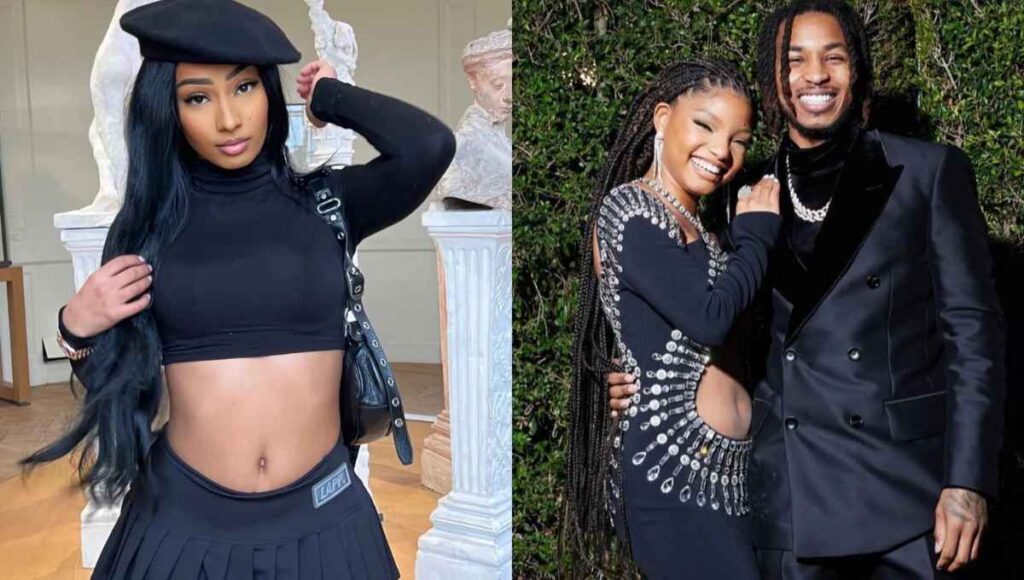Rubi Rose: The Latest Buzz & Leaks - What You Need To Know!
Is the internet's fascination with celebrity leaks a symptom of a deeper cultural obsession with privacy, or simply a reflection of the modern media landscape? The recent attention surrounding Rubi Rose, a prominent figure in the American rap and modeling scenes, and the alleged circulation of explicit content, highlights this complex issue, drawing attention to the evolving relationship between fame, privacy, and online discourse.
The digital age has undeniably blurred the lines between the public and private lives of celebrities. Social media platforms, designed for instantaneous sharing, have inadvertently become fertile ground for the rapid dissemination of both legitimate and unverified content. This has led to a constant state of speculation and rumor, particularly when it comes to content of a sexually suggestive nature. The case of Rubi Rose is a prime example of how quickly a celebrity can become entangled in this web, regardless of their intention.
Reports have surfaced across various online platforms regarding potential leaked content featuring Rubi Rose. These allegations, fueled by the nature of the internet, have quickly spread, igniting significant online chatter. While the authenticity of such material remains unconfirmed, the mere suggestion has been enough to generate considerable interest. The impact of this attention is multifaceted, ranging from the creation of clickbait and sensationalized articles to more serious conversations about the exploitation of individuals and the ethics of online content.
One aspect that adds another layer to the discussion is the apparent intersection of marketing strategies and the online rumor mill. Earlier, there was a significant buzz surrounding a fan who allegedly spent over $62,000 on Rubi Rose's OnlyFans content. As per reports, the alleged "fan" who was later identified as a hoax, had the intention of boosting the artist's profile. This created an interesting narrative of how far influencers can go to get engagement.
The artist, Rubi Rose, as an American rapper and model, embodies the modern intersection of multiple artistic disciplines. She is known for her work as a musician, her modeling career, and her presence on platforms like OnlyFans. Rose's public image is thus a carefully curated blend of artistic expression and commercial enterprise.
| Category | Details |
|---|---|
| Full Name | Rubi Rose Benton |
| Date of Birth | October 2, 1997 |
| Place of Birth | Lexington, Kentucky, USA |
| Nationality | American |
| Known For | Rapping, Modeling, OnlyFans Content |
| Genres | Hip Hop, Trap |
| Career Highlights |
|
| Professional Information | Model and rapper, known for her work in the music industry and adult content creation |
| Website Reference | Rubi Rose Instagram |
The recent developments also demonstrate the fast-paced nature of internet virality. A tweet, with a suggestive image and alleged screenshots, gained rapid traction, accumulating significant likes and views within a short span. The tweet's impact underscores how quickly content can disseminate and the power of social media in amplifying narratives, regardless of their origin or veracity.
The case of Rubi Rose is not an isolated event. The online sphere has seen similar incidents involving other public figures. The emergence of AI-generated content further complicates the landscape, making it difficult to ascertain the legitimacy of such material. This technological advancement adds another layer of complexity to the situation, raising concerns about the potential for manipulation and misinformation.
The media coverage surrounding these incidents varies. While some sources focus on the entertainment value and potential scandal, others take a more critical approach, addressing ethical concerns. Some media outlets, for instance, may highlight the legal and privacy implications of non-consensual content, while others may focus on the financial aspects, such as OnlyFans subscriptions and the potential for exploitation.
The debate over celebrity leaks and content distribution raises important questions about the responsibilities of individuals and platforms. Where does the line fall between freedom of expression and the protection of personal privacy? Do social media companies have a responsibility to monitor content and prevent the spread of potentially harmful material? These are the questions that need to be seriously debated.
The incident also touches upon the evolving world of marketing strategies. The alleged "hoax" involving the OnlyFans subscription underscores the potential for orchestrated controversies designed to drive engagement and increase visibility. This raises the important question: to what extent are the public being manipulated through such tactics, and what impact do these techniques have on the authenticity of online interaction? The answer is yet to be discovered.
In the end, the Rubi Rose case serves as a complex example of celebrity, privacy, marketing, and social media in the digital era. It highlights the blurred lines between the public and private spheres, the impact of online virality, and the ethical considerations that emerge in a society saturated with digital information. As technology continues to evolve, and the interplay between content creators, platforms, and audiences becomes more intricate, it is crucial to have an open dialogue and understanding of the implications of this emerging landscape.


